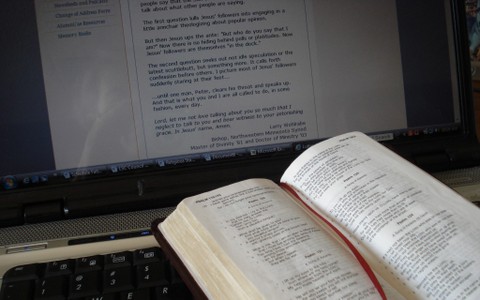2 Sam. 6: And David and all the house of Israel were celebrating before the Lord, with songs and lyres and harps and tambourines and castanets and cymbals. And when they came to the threshing floor of Nacon, Uzzah put out his hand to the ark of God and took hold of it, for the oxen stumbled. And the anger of the Lord was kindled against Uzzah, and God struck him down there because of his error, and he died there beside the ark of God. And David was angry because the Lord had broken out against Uzzah. And that place is called Perez-uzzah to this day.
This is one of those puzzling places in Scripture that carries a lot of opinions when people try to explain it. I confess up front that I do not understand everything about the story, but there is one thing that I see very clearly; God does not like to be handled. What I mean by that, is that God wants us to live by faith, and doesn’t need our help, just our participation. When we try to manipulate situations, and try to control them as well as other people, hoping to guarantee a certain outcome, then we are trying to handle God instead of trusting him. He does not need our carnal sweat. Man’s independent best effort was the cause of the Fall, and our attempts to help God out are manifestations of that fallen condition that still impacts us. God doesn’t want our help; He wants our trust. It’s not just a matter of our reaching out in practical ways trying to manipulate and control people and situations, but it is also those internal attitudes of anxiety, worry, and fear, that represent a disposition in us that’s trying to control the activity of God. At the heart of worry, anxiety and fear, is unbelief, because uncertain of how God is going to work out a situation we, in our minds, and therefore manifested in our emotions, try to figure it out. This is another way of trying to handle God. I come from a long line of professional worriers, and I had pretty much perfected worry as an art form when I gave my life to Christ. Having given my life to Christ, I simply transferred my worry and made it religious, because I still continued to worry about whether or not I could handle things or how things were going to turn out. I did not realize that I was dishonoring God, but I was. I now belonged to Him, and He had committed Himself to me, which is infinitely more important than the fact that I had committed myself to Him. I remember when I began to break through into faith and get set free from crippling anxiety and fear when one day He spoke very clearly to me and said “I give you permission to worry.” It is hard to explain, but that was kind of a relief to me because worry was such a normal part of my life, and it made me feel like I had some element of control because I could worry. He then spoke these words all those decades ago to me that changed my life forever; He said, “you can worry about all those things I am not big enough for.” When I heard those words I understood that for one thing I would never face anything that He would not be big enough for, and secondly every time I entertained worry, and anxious thoughts, I was simply saying “God, you are not big enough for this, and you need my management.” It became one of those watershed moments that propelled me into a fuller understanding of what it means to live by faith, and what unbelief is actually saying to God. He promises to be faithful, and that His grace is always sufficient, and that He causes all things to work together for good. If all that is true, then worry, and anxiety is simply unbelief, and and it grieves His heart. God does not need us to manage Him, either by our activity, or internally in our thought life. He is big enough; therefore we don’t have to be. Even in our weaknesses His strength is made perfect.

